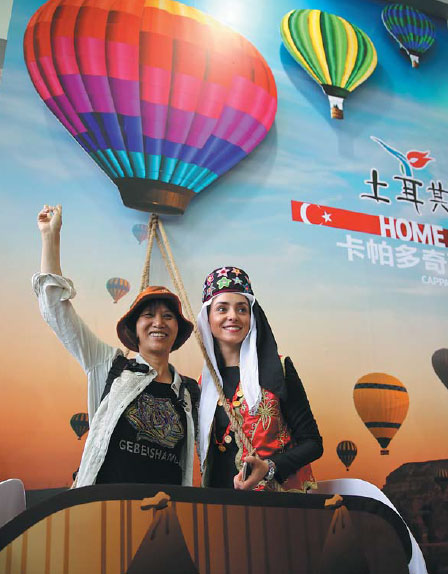China-Turkey: transformational prospects
On Aug 4, 1971, the Turkish ambassador in Paris Hasan Esat Isik and the Chinese ambassador Huang Zhen, signed a protocol establishing diplomatic relations between the two countries. Now, 45 years later, China is Turkey's largest trading partner in the Asia Pacific and second largest in the world.
Our relations have been elevated to the level of strategic cooperation.
We are now exchanging regular high level visits. President Recep Tayyip Erdogan's State visit to China last year was a landmark event which furthered the trust between the two countries.
Our foreign ministers have a solid working relationship, and are keen on having regular consultations. In addition to the well-designed Joint Working Group mechanism, our foreign ministries held their first strategic dialogue meeting this year.
Soon, we are going to hold the first meeting of the cooperation mechanism at the deputy prime minister level. We will support this process with several instruments.
Turkey and China also have substantial cooperation in major regional and international organizations.
The United Nations is an essential venue for both countries. Turkey handed over the term presidency of the Conference on Interaction and Confidence-Building Measures in Asia to China in 2014. This was followed by the transfer of the G20 presidency to China for 2016.
Last year, Turkey became one of the founding members of the Asian Infrastructure and Investment Bank and declared its strong interest in China's Belt and Road Initiative.
A memorandum of understanding was signed in Antalya, Turkey, on aligning the Belt and Road Initiative with Turkey's Middle Corridor project. This MOU was not only about transportation and logistics, but also creating connectivity in several fields, including people-to-people contacts.
In brief, our bilateral relations have been upgraded from those of interested parties to those of practical partners. With the right choices, this relationship can play a significant role in enhancing regional and global stability in the years ahead. Our task should be to strengthen the transformational fundamentals of this relationship.
Turkey has the background and ability to be a connector, a central country, not only in the geographical sense but also with regard to its diplomacy, economy, history and culture. Turkey assumes an active role in endeavors to foster mutual respect and common values among different cultures and religions. As an emerging energy hub and a major transit country, Turkey also plays an important role with respect to global energy and trade security.
China is now a major power, an economic giant which is becoming more and more active in international affairs. As the Belt and Road Initiative demonstrates, it is also an initiator of ideas that can serve global development and enhance connectivity.
Both countries represent unique and successful models, combining elements of Eastern and Western cultures without refusing other traditions. Both have followed novel paths toward modernity after devastating wars and struggles. With these qualifications, they can be efficient partners, offering their contributions to tackling global problems.
In order to strengthen the transformational fundamentals of our bilateral relationship, we have to reinforce it with new elements.
When I was presenting my credentials to President Xi Jinping in 2014, I also had the opportunity to discuss the China-Turkey relationship. In that conversation, I underlined my hope for the creation of a "21st century relationship", which will be based on the rich history and past experiences between our two countries, but which will also transform itself into a modernized connection based on more trade, intensified economic activities and cooperation in technology and innovation.
As China has its "Chinese dream", we have a "Turkish dream". We share similar visions for the future of our countries: Turkey has set specific targets for 2023, which marks the centenary of the Republic of Turkey, and China is working to achieve its "Double Centennial Goals". The main aspirations can be summarized as reaching a higher level of development and welfare for larger segments of our societies.
As active members of the G20, Turkey and China are also pursuing a more representative global system. This should be the century of unity and win-win cooperation. "Us against them" policies will not carry the global community forward.
We should also be able to address the root causes of despair, which is a powerful feeling overshadowing hope in several parts of the world. The G20 is a group that can offer so much in that respect. It should also continue to speak on issues like the refugee problem and terrorism. These issues are directly linked with sustainable development, stability and peace.
Sustainable development cannot be achieved without innovative growth. The Chinese G20 presidency, among other things, has also actively addressed this issue. We will also see new ground covered on structural reforms, ensuring global trade growth, deepening the reform of international financial architecture and addressing environmental concerns. That is why the agenda and the achievements of this G20 will be immensely important.
The author is the Turkish ambassador to China.
|
A Chinese visitor poses for a photo at the booth of Turkey at a tourism expo in Beijing. Feng Yongbin / China Daily |

























